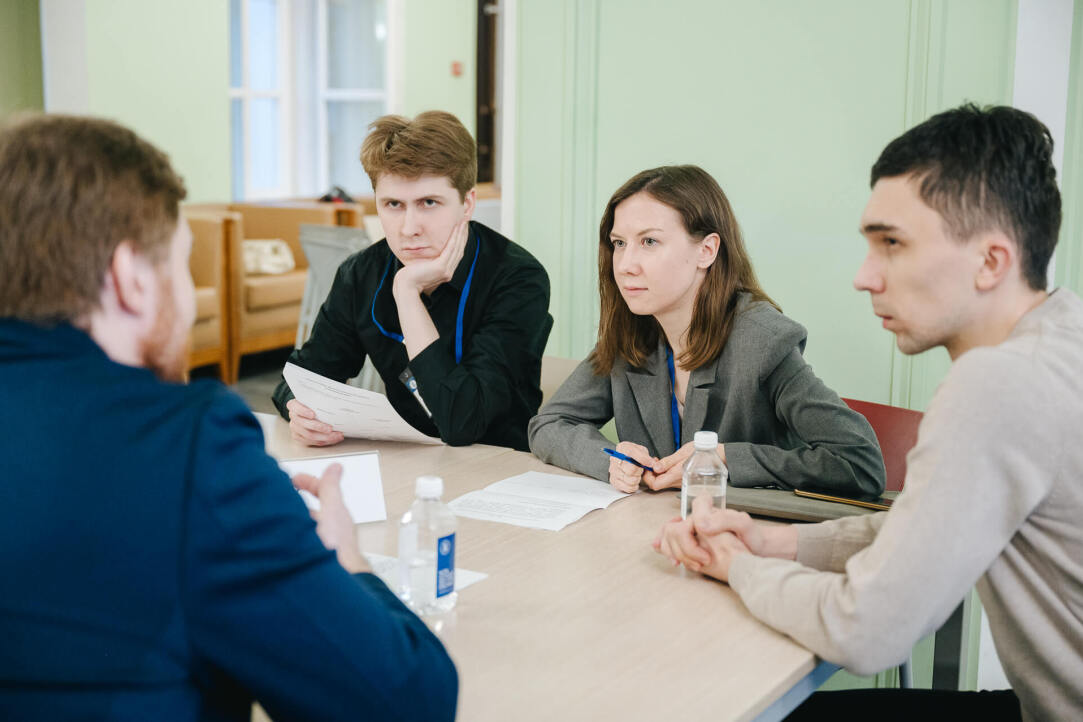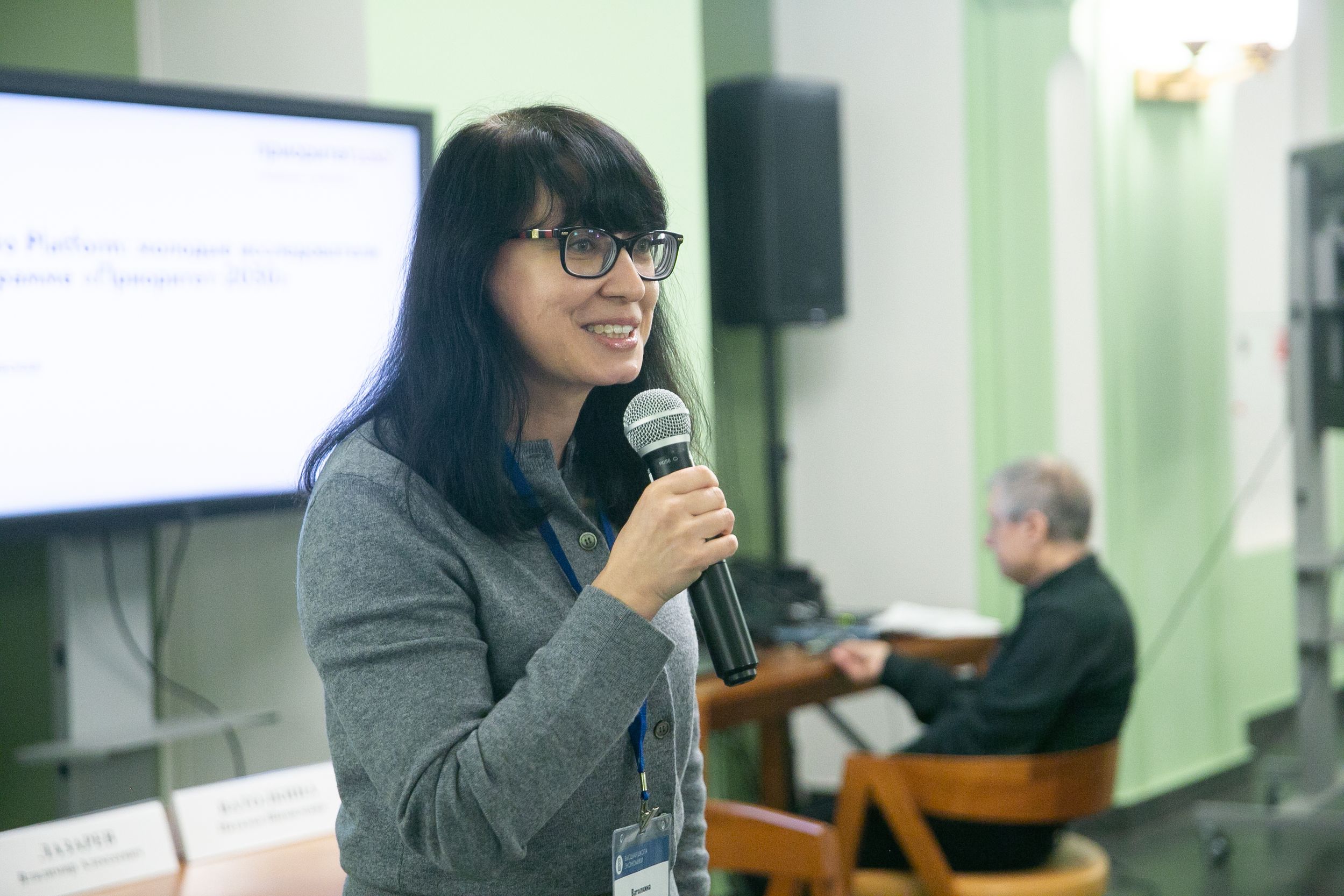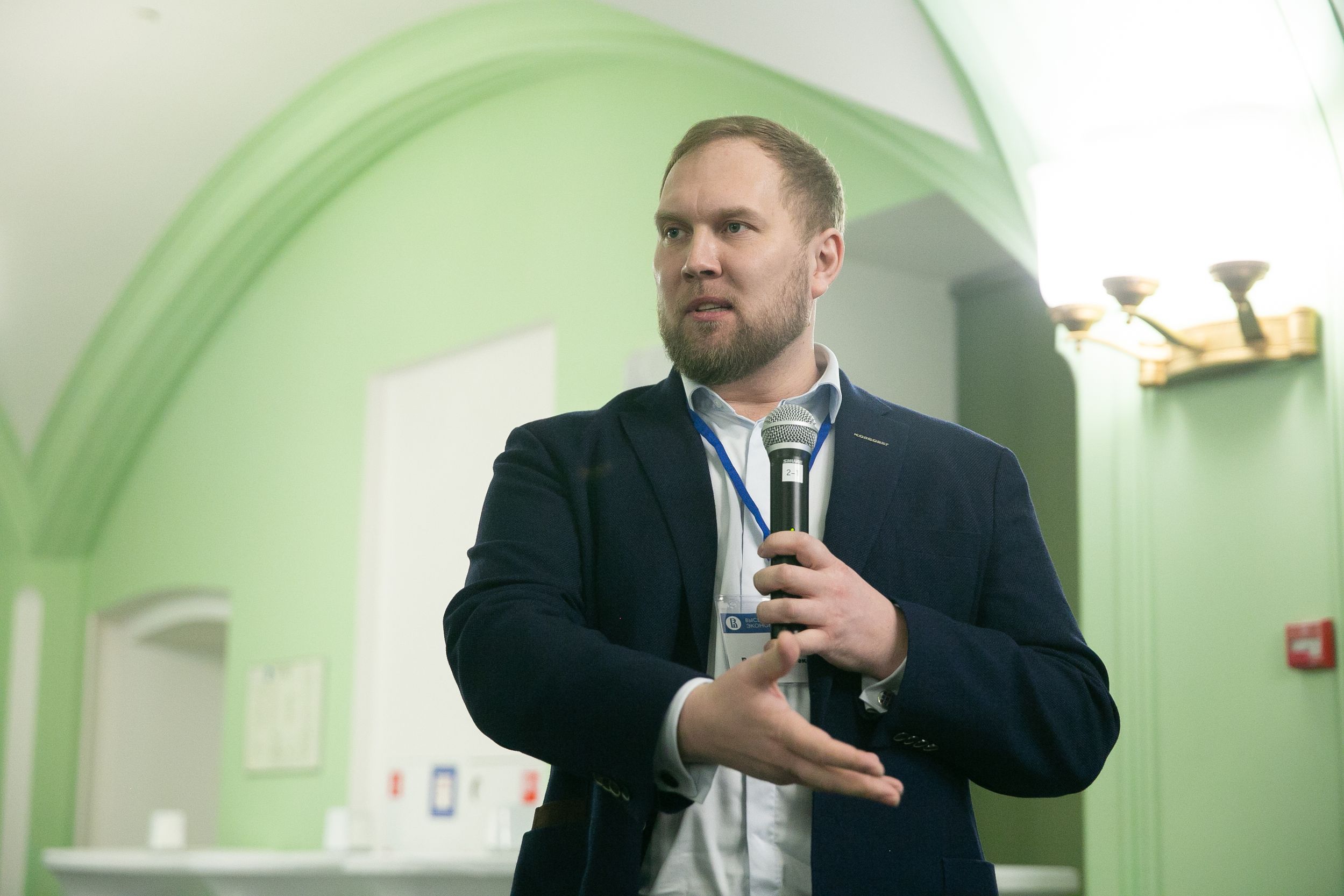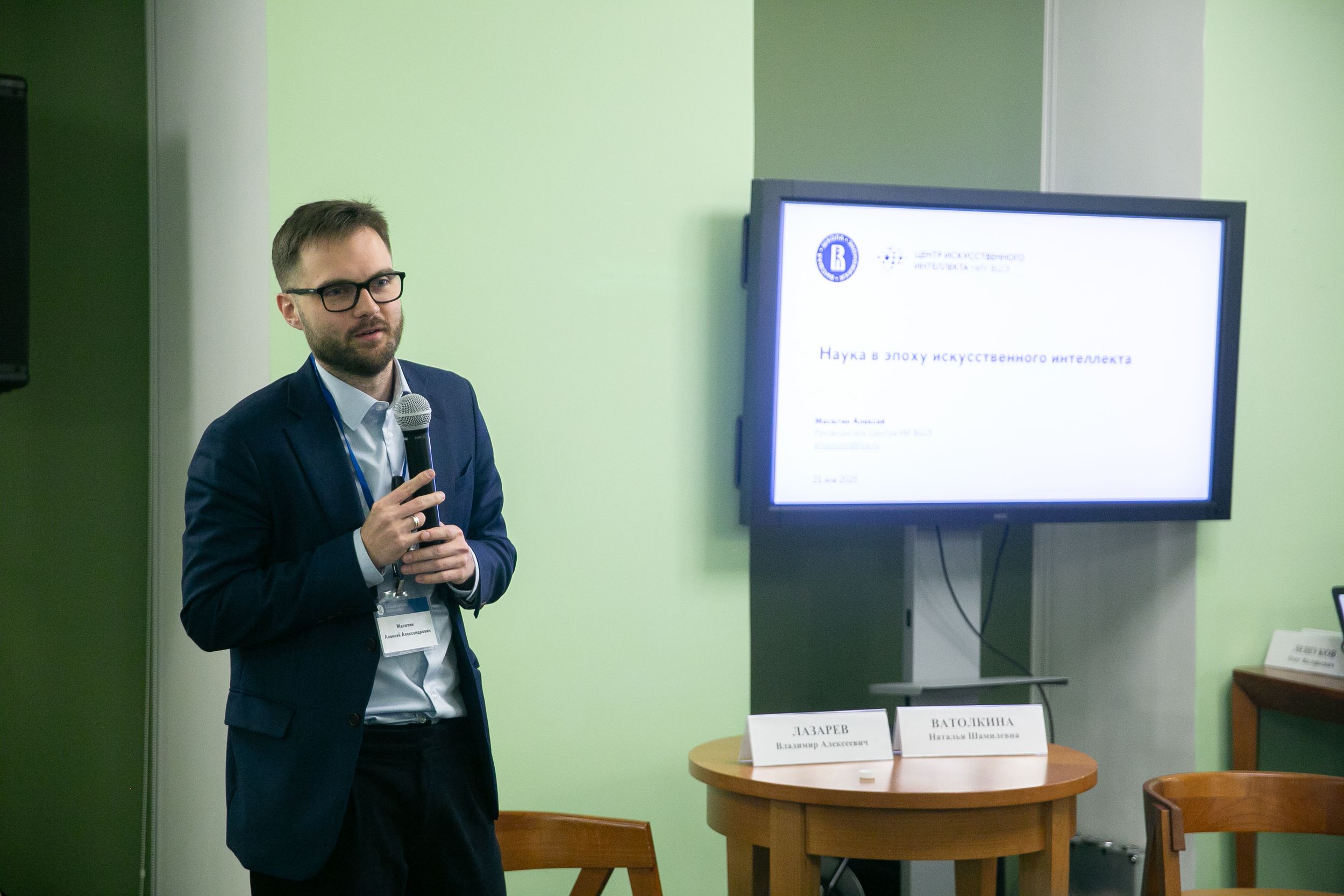New Science: How Early-Career Researchers Reach New Heights

In the context of increasing global competition, countries are striving to ensure technological sovereignty. Those who can ensure economic development and concentrate intangible assets and human capital are emerging as leaders. The growing demand for qualified staff leads to an increase in the role of universities and the demand for early-career scientists. The challenges and opportunities for prospective specialists in the scientific community were discussed at the ‘StratPro Platform’ strategic session at HSE University.
On January 29, HSE University hosted the strategic session ‘StratPro Platform: Early-Career Researchers in the Priority 2030 Programme.’ Opening the event, Natalia Vatolkina, HSE Deputy Vice Rector, spoke about the Priority 2030 Federal Academic Leadership Programme and the strategic projects implemented by the university under this programme. Strategic projects are portfolios of thematically linked research initiatives that integrate social sciences, humanities, and digital sciences and contribute to the transformation of the university's research and innovation activities. In 2024, over a thousand researchers participated in the implementation of five strategic projects, with the total amount of funding exceeding 250 million roubles.

Natalia Vatolkina stressed that the number of projects supported on a competitive basis is increasing every year. Early-career research project competitions to implement strategic projects have been held since 2022. In 2024, the process for selecting such projects was significantly updated and standardised for all strategic projects and HSE campuses. The competition committee supported 24 projects out of the 45 applications received during the 2024 competition. Half of the supported projects were led by doctoral students and undergraduates, and the average share of early-career researchers, undergraduates, and doctoral students in supported teams exceeded 85%.
‘HSE University provides quite a lot of support programmes for undergraduate, graduate, and doctoral students. These include the Science Republic community, Science Battles, various research competitions, intensive courses, and an academic development programme. Early-career research project competitions in the framework of strategic projects complements these programmes,’ says Natalia Vatolkina.

The involvement of early-career scientists in solving pressing tasks related to social and national development is a priority of the Decade of Science and Technology announced by Russian President Vladimir Putin. Vladimir Lazarev, member of the Coordinating Council for Youth in Science and Education under the Russian President's Council for Science and Education, spoke about key areas of the council’s work in forming an effective system for involving young people in research and development, and also shared his own research experience and work in the Coordinating Council.
Speaking about the most important elements, he recalled the Science-ID platform for early-career scientists (which consolidates information on measures to support prospective scientists in Russia, including scientific volunteering and popular science tourism), the Nasha Laba catalogue of scientific equipment and consumables, the ‘President, I have an idea!’ one-stop shop service for initiatives in scientific and technological development in Russia, and others. In total, there are about 280 measures of support for early-career researchers in Russia, including awards from regional governments, research grants, scholarships for scientific achievements, housing certificates, various benefits, internships, and more. The audience showed particular interest in initiatives to create communities of early-career scientists, including the ‘Youth Laboratories’ and ‘School for Early-Career Researchers’ projects, which will be developed in 2025. Vladimir Lazarev urged his colleagues to be persistent in their initiatives and emphasised the importance of effective communication between researchers, the government, and society.
‘Pay attention to popular science projects. As scientists, we need to tell the public about our research, and it also helps us find like-minded people,’ said Vladimir Lazarev.

Alexey Masyutin, Director of the AI and Digital Science Institute, discussed the increasing role of artificial intelligence technologies in science with early-career researchers. He presented the most striking examples of the use of AI in applied research, including innovative methods of protein generation and the latest methods for assessing the risks of various diseases. He highlighted the role of AI in fundamental science, giving an example of using a digital model of the muon magnetic reflector for the Large Hadron Collider. The speaker concluded by talking about the development of AI assistants for students and study offices, as well as AI assistants for accurately summarising scientific topics—something useful to researchers.
As part of the ‘My Project in the Priority 2030 Programme’ discussion platform, HSE early-career scientists spoke about their own research experience.
Centre for Language and Brain Research Fellow Olga Buivolova, who led a project on noninvasive brain stimulation to correct speech disorders, spoke about her journey from research assistant to a team leader who participated in two of the university’s strategic projects.
Anna Provorova, Junior Research Fellow at the Centre for Cognitive Neuroscience (HSE University in Perm), presented the NeuroSkate neural network for analysing the movements of young athletes during figure skating training, which is designed to improve the effectiveness of teaching in children's sports schools.
Anastasia Andreeva, Head of the Laboratory for Educational Innovation Research at the Institute of Education, shared her own experience of becoming an early-career manager and gave some practical tips to the participants.
Olesia Maibakh, Head of the Foresight Research Methodology and Organisation Unit at HSE ISSEK, presented the results of an analysis of the possibilities of using science-fiction methods to develop long-term forecasts of scientific, technological, and socio-economic development, sharing the plans of the research team and telling colleagues about the pitfalls of planning.
The session organisers paid special attention to the commercialisation of the scientific achievements of early-career researchers. Andrey Zizin, Deputy Senior Director for Financial Affairs, Associate Professor at the School of Innovation and Entrepreneurship, conducted a master class on the most important aspects of a successful commercialisation project, common errors, and measures to support research entrepreneurship at HSE University.
‘A commercialisation project doesn’t have to be at the same level of readiness on all scales at the same time or to advance symmetrically. However, large differences can become an obstacle to progress in entering the market with a new product and increase the risk of failure,’ explained Andrey Zizin.
The participants had an opportunity to put their knowledge into practice during the discussion session ‘Commercialisation of the Achievements of Early-Career Researchers: Brain Storm,’ during which interdisciplinary teams discussed research initiatives and determined the main obstacles to their commercialisation. During the brainstorming session, the participants defined ways to overcome these barriers both by stimulating the initiative of research teams and through support from the university, including the creation of a one-stop shop for packaging and promoting innovative products, a knowledge base and an AI assistant in the field of commercialisation, and more. The participants discussed their findings with invited experts, including Andrey Zizin; Anton Yanovsky, Director of the Centre for R&D Commercialisation and Technology Transfer; and Konstantin Sinyavsky, Director of the Legal Support Centre for Research Activities, Intellectual Property and Data Protection.
In the final part of the strategic session, Yulia Milshina, Senior Research Fellow at the International Research and Educational Foresight Centre at HSE ISSEK, spoke about global trends in scientific and technological development, their connection with current economic and social changes, as well as Russia's priorities in the new environment. Noting among the main challenges the ‘rising cost’ of science, the growth of scientific inequality between countries and the deglobalisation of science in favour of the formation of techno-economic blocs of countries, she stressed that the main barrier to the development of science is the shortage of personnel and the level of competence. The ability to produce highly qualified scientific personnel will be a key factor in the competitiveness of countries in the coming decades.
‘The requirements for the quality of staff, for training and retraining of personnel are growing many times. Your efforts, enthusiasm, and energy are aimed at the greatest goals, and I would like to wish you breakthroughs and interesting results so that this interest does not fade,’ said Yulia Milshina.
At the end of the strategic session, Natalia Vatolkina presented certificates to the winners of the 2024 Early-Career Research Project Competition, who carried out research within the framework of all five strategic HSE projects.
See also:
Neuroscientists Reveal Anna Karenina Principle in Brain's Response to Persuasion
A team of researchers at HSE University investigated the neural mechanisms involved in how the brain processes persuasive messages. Using functional MRI, the researchers recorded how the participants' brains reacted to expert arguments about the harmful health effects of sugar consumption. The findings revealed that all unpersuaded individuals' brains responded to the messages in a similar manner, whereas each persuaded individual produced a unique neural response. This suggests that successful persuasive messages influence opinions in a highly individual manner, appearing to find a unique key to each person's brain. The study findings have been published in PNAS.
Five Strategies for the Future: Key Achievements of HSE Strategic Projects in 2024
During the past year, scientists at HSE University have worked on five strategic projects aimed at advancing key areas essential to the development of modern individuals and society. Each of these projects is unique, yet they share common goals: creating innovative product solutions, generating fresh ideas for the economy, social sector, science, and education, and contributing to the university's research potential.
'We Are Creating the Medicine of the Future'
Dr Gerwin Schalk is a professor at Fudan University in Shanghai and a partner of the HSE Centre for Language and Brain within the framework of the strategic project 'Human Brain Resilience.' Dr Schalk is known as the creator of BCI2000, a non-commercial general-purpose brain-computer interface system. In this interview, he discusses modern neural interfaces, methods for post-stroke rehabilitation, a novel approach to neurosurgery, and shares his vision for the future of neurotechnology.
Humans, Bots, and Digital Twins: Year-End Results of the Strategic Project 'Human Brain Resilience'
HSE University hosted a joint research seminar to review the 2024 results of the Strategic Project 'Human Brain Resilience: Neurocognitive Technologies for Adaptation, Learning, Development and Rehabilitation in a Changing Environment.' The event showcased the progress and outcomes of fundamental and applied projects focused on developing technologies for neurodiagnostics, neuroadaptation, and neurorehabilitation—collectively known as 3N technologies. The objective is to develop tools that can help prevent neurogenic and psychiatric disorders or alleviate their consequences.
HSE and Integration Education Centre to Develop New Programmes for Agrobiotech Advancement
HSE University and ANO Integration plan to jointly develop projects aimed at creating new approaches to education and advancing innovative agrobiotechnologies. The parties signed the corresponding agreement at the XI Congress ‘Innovative Practice: Science Plus Business.’
Virtual Mozart, Venture Capital Bot, and Educational Video Generation: How AI is Used at HSE University
In mid-November, HSE University hosted a meetup where faculty, researchers, and administrators presented their projects and shared experiences with using AI technologies in education and research. The meeting was part of the continuing professional development programme 'Artificial Intelligence in Education and Research.'
(Ab)normal Language: HSE Researchers Present Digital Tools for Assessing Mental Health Problems
Often, individuals with neurological or mental disorders exhibit distinctive language patterns. In modern clinical practice, digital tools can play a significant role in supporting language therapy and rehabilitation for persons with language disorders. Additionally, in the future, digital tools could assist healthcare specialists in assessing the severity of symptoms associated with such disorders.
HSE Scientists Propose Using Heart Rate Analysis to Diagnose Anxiety and Depression
A group of scientists at HSE University have discovered how anxiety and depression can be diagnosed by analysing heart rate. It turns out that under mental stress, the heart rate of individuals with a predisposition to mental health disorders differs from that of healthy individuals, especially when performing more complex tasks. These changes in cardiovascular parameters can even be detected using a pulse oximeter or a smartwatch. The study findings have been published in Frontiers in Psychiatry.
Narcissistic and Workaholic Leaders Guide Young Firms to Success
Scientists at HSE University—St. Petersburg studied how the founder's personal characteristics impact a young firm's performance. It turns out that a narcissist and workaholic who also fosters innovation will effectively grow their company. The paper has been published in IEEE Transactions on Engineering Management.
Exploring Research Prospects and Collaboration Opportunities: Discussion of Strategic Projects Held at HSE University
On June 26 and 27, HSE University at Pokrovka hosted a discussion of potential partnerships between the university's research teams and strategic projects under the Priority 2030 programme. During the two-day session, the heads of strategic projects presented the main areas of their ongoing research, highlighted some of the key results achieved, and shared their vision for involving new researchers in the projects.


